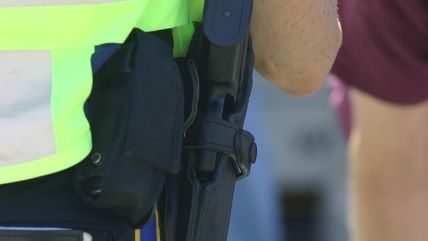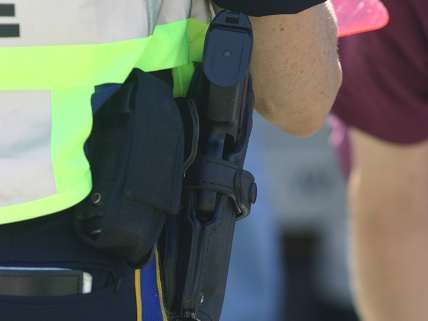Pennsylvania State Trooper Suing To Get Right to Bear Arms in Private Capacity Back
Prohibited by federal and state law from owning a firearm because of a previous involuntary commitment.


A federal district court judge in Pennsylvania granted a motion to amend judgment, reviving a lawsuit brought by a Pennsylvania state trooper against the federal government to get his "private capacity firearm rights" back.
Judge John Jones III's ruling gives both sides ten days to agree to terms to a new trial for the trooper, Michael Keyes, who is prohibited by state and federal law from possessing or using a firearm because of an involuntary commitment stemming from what court documents described as an "emotionally devastating" divorce, where Keyes is alleged to have been "imbibing in alcoholic beverages and making suicidal statements."
Pennsylvania state law prohibits anyone who has been involuntarily committed from possessing or using a firearm, and federal law prohibits anyone who had been committed to a mental institution from owning a gun. Nevertheless, the laws did not prevent Keyes from employment in law enforcement. In fact, the federal statute "provides an exception to the firearms disability created by [federal law] …for individuals benefitting in their official capacities the federal or state government."
The judge's ruling notes Keyes carries a handgun while on duty and a fully automatic rifle and shotgun while on patrol. In 2008 Keyes sought in state court to get his rights back, and was relieved of his state "firearms disability." Keyes also filed a request to get his involuntary commitment expunged, but the Superior Court eventually ruled state courts did not have such an authority.
Keyes' lawsuit was eventually joined by Jonathon Yox, who discovered in 2012 after failing an instant background check that he too could not legally possess a firearm. Yox, who had become a state correctional officer, was involuntarily committed as a 15-year-old because he was, as the court described, "emotionally devastated" by his parents' divorce. He was reported to have cut himself "under the influence" of his girlfriend and made a suicide pact with her. In 2008, at the age of 17, Yox enlisted in the U.S. Army end spent six and a half months in Afghanistan where, the court notes, he used fully automatic rifles, machine guns, explosives, and grenade launchers. The army did not recommend psychological evaluations for Yox after his honorable discharge.
A state court granted him relief from the state "firearms disability" as well, but based on the previous Keyes ruling declined to expunge his record. The Bureau of Alcohol Tobacco and Firearms (ATF), the court notes, "confirmed" that Yox was prohibited from private possession or use of a firearm but could continue to work as an armed state corrections officer.
A federal court eventually ruled that the Superior Court in Keyes used the wrong standard, going with a test from the case U.S. v Marzzarella, which found a law requiring legally possessed firearms to have serial numbers did not infringe on the Second Amendment and established a test on whether "the challenged law imposes a burden on conduct falling within the scope of the Second Amendment's guarantee… [and if so] whether that law survives a means-end scrutiny." The federal court decided a better fit would be U.S. v. Barton, which upheld a law prohibiting felons from possessing firearms and set a test about establishing distinguishing circumstances in the face of a prohibition, and based on that precedent granted Yox relief.
That triggered Keyes' attorneys to file a new motion. Judge Jones decided the only substantive difference between the two cases is that Keyes claimed his Second Amendment rights in a state court first, and that that should not bar him from claiming the rights in federal court, calling Keyes, "quite literally, a man without a remedy."
The judge also noted that "because Congress has not funded and Pennsylvania has not established a mechanism to petition for relief from federal firearm disabilities, both were left without recourse to challenge their loss of private gun rights under federal law."
The federal law seems to go about gun control precisely in the opposite way than the Second Amendment would suggest. Those employed by federal, state, and local governments to bear arms in the enforcement of the laws should be held to higher standards than private citizens who are guaranteed that right by the Constitution.
Keyes and Yox should not be impeded from exercising their Second Amendment rights because of involuntary commitments which (as they argue) didn't afford them due process. Their predicament is an illustration of just how damaging to civil rights laws which impose restrictions based on overly-broad but feel-good measures can be. On the other hand, employment as an armed agent of the state is not a right articulated in the federal Constitution nor any state constitutions. The state, then, ought to exercise gun control over those it privileges with guns in a professional capacity, not grant such privileged individuals exceptions to the control laws it imposes on the rest of us.


Show Comments (40)